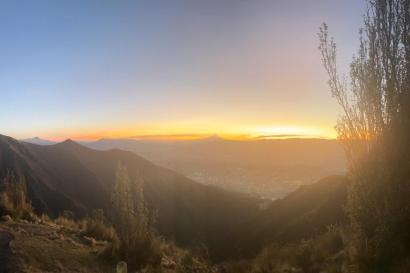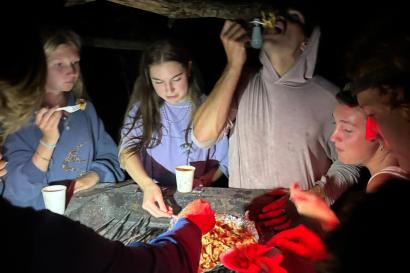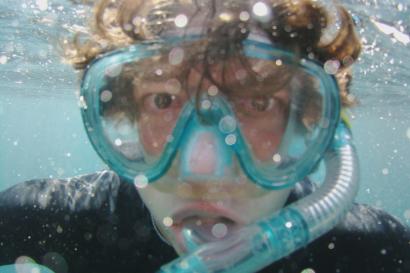As everyone is more than aware, the whole world is on lockdown right now due to the COVID-19 pandemic. Restaurants are closed, social gatherings canceled, and study abroad students sent home. One of my parents’ favorite new stories to tell to their friends and coworkers over zoom is how exactly that last part happened because getting home from studying abroad was anything but easy. Now that I’ve been home for a few weeks and the initial shock has worn off, I have to agree, it’s pretty crazy - so without further ado, here’s my story.
I guess the best place to start is Thursday, March 12th. There was already a certain kind of buzz in the air, as we were all talking about friends studying in Europe who had been sent home, COVID cases in the NBA, and Tom Hanks being sick in Australia. It was surreal to think that all this was happening outside of our little bubble of the Galapagos, and we joked that we were the last men standing.
That night, Ecuador announced that all classes would be moved online, which meant our university too, even though there were no COVID cases in the Galapagos. For us, this was cause for celebration - the next day we were supposed to have a final exam, and it was canceled. Friday was uneventful, and we spent it packing to leave the next morning on spring break, which for the IES Abroad kids meant island hopping for four days.
Saturday morning, bright and early, we left for Floreana. That day was incredible - sailing from island to island, we saw a whale surfacing near our boat, along with countless sea birds and marine iguanas as we neared the rocky coast. On Floreana, we explored the highlands, snorkeled, and walked the coastal lava fields. We hopped back on our boat and headed to Isabela Island to spend the night.
I should mention something very important - the whole day while we were on Floreana, we were out of cell service because it’s one of the more remote islands. We were pulling into the port on Isabela, and had just spotted a penguin waddling on the rocks when our phones blew up. While we were gone we had gotten texts, emails, and calls all saying the same thing: Ecuador is closing all travel in and out in 48 hours, and that we needed to be out of the country by then.
Everything went into a sort of frenzy. Originally when classes went online, we had been told that we’d return to the mainland after spring break where the wifi was better, and could finish the semester there. But now we had to figure out how to get out of Ecuador before borders closed, or be stuck there indefinitely. Everyone started booking flights (or more accurately, calling our families to do it for us because wifi in the Galapagos is too slow). Some people were pacing around in a panic, while others had bought beers from the food counter at our hotel and were taking a seat to wait for more information.
I called my dad, waking him from his nightly nap on the couch after falling asleep to the lull of the tv. By some stroke of luck, he was able to book one of the last available flights back to the U.S. A few minutes later, there were none left. Throughout the night plans kept changing every thirty or so minutes as IES Abroad staff and USFQ correspondents got new information. Finally, they settled on us taking a boat early the next morning to an airport on another island called Seymour to catch a flight back to the mainland, with no opportunity to return to San Cristobal. We were told to contact our host families and tell them to pack up all of our belongings, which were to meet us by boat on Seymour. We did so, and sometime around 11 PM, we decided to walk to the beach instead of sitting around and worrying.
It was a still night, with more stars than I’d seen on San Cristobal or Santa Cruz. The sky stretched into sea, and we lay on the sand listening to soft music from someone’s speaker. We took in the fact that it was all over and prepared for the extensive travel ahead of us.
4:50 AM, we left the hotel. It was still dark as we loaded into vans that carried us down to the docks of Isabela, where we and all of our luggage load onto two water taxis (which are essentially long dinghies used to move people from the dock to larger boats). The hum of the motor slapping water was the only sound - it felt as if we were fugitives being smuggled across a border as we pulled farther away from the shore and into the first grey skies of dawn. Hauling our backpacks onto a speedboat, we boarded and crammed together, settling in for a long ride across rough seas.
Around 8 AM we docked on Seymour Island, and stepping off the speedboat we were greeted by our luggage, piled precariously on the top of a larger boat. How the bags hadn’t fallen off, I had no idea. We gathered our stuff, hopped on a bus, and went to the airport where we checked to make sure that we had everything (my host mom packed my suitcase with incredible skill, that thing was like a winning game of Tetris).
There we waited for about two hours in line, then another two to board a plane to Quito. The airport was packed with frantic travelers trying to get off the islands before flights stopped, and some planes were overbooked. A couple of the students were forced to stay behind and catch a different flight, and they returned to San Cristobal where about a dozen non-IES Abroad students were still stuck.
When our flight finally touched down in the mainland, we were met by vans that took us to a hotel. Our program director had arranged for everyone to have up to two nights there if needed, and we were grateful for a place to rest. This is by far the nicest place I’ve ever stayed - huge fluffy king beds, a rain shower bigger than my whole bathroom at home, and a delicious meal provided for dinner that night. We ate, showered (At this point, I had been wearing the same clothes for two days, crusted with sand, sweat, and ocean water), and took care of what we needed to. Some students clustered in the lobby, scouring the internet for a flight home, most having no luck. Others went to their rooms to rearrange the stuff in their bags since they were leaving that night or early the next morning. A couple, like me, waited downstairs to meet host family members who were bringing items left in Quito.
I met my Quito host mom, Anavela, who was carrying a large shopping bag of my winter clothes, some shoes, and souvenirs I had gotten while on the mainland. We hugged and cried. She told me how afraid she was for her daughter who was (and is still) stuck in France. It was an emotional moment - but I can’t express how grateful I was to get to see her again before leaving. None of us had gotten to say goodbye to our host families in the Galapagos, and so many of them had become like second families to us. I had gotten especially close to my Quito host family, so getting to see at least one of them one last time was a privilege not all the students got to have. I watched Anavela drive away from the stairs to the hotel, and then took a deep breath and went back inside. Even though it had already been a long and emotionally draining day, it was nowhere near over.
In groups of two or three, people started to leave to catch their flights back to the US. We’d say one goodbye, take an hour to be sad, and then just as we were feeling a bit better another close friend would leave. We go to school and live spread across the whole country, and though we talk about meeting up, the reality is that not all of us will see each other again. In between solemn trudges to the lobby to send someone off, we would gather in one of the rooms talking, joking, and trying to enjoy as much of each other's company as we could. Around 1 AM, the last person for that night had left, and we divided off to get some sleep.
Early the next morning, around 7:30, I was up to start the goodbyes again. That day was a lot of the same; though with our numbers dwindling and more flights being canceled every hour, the tension was growing. Finally, around 6 PM, me and my friends Brendan, Dain, Celia, left to go to the airport. We were joined by about five of our other friends, who still didn’t have flights, and were coming to see if they could buy tickets at the airport. We packed into a van and headed over.
When we rolled our suitcases up to the door of the airport, we were stopped by security checking passports and tickets. Apparently, panicked travelers had been crowding the airport trying to get last-minute tickets, so now only those with booked flights were allowed to enter. We said rushed goodbyes to our friends without tickets and then got in line as quickly as possible. We’d heard from a student who got there earlier that all the flights were overbooked, and they were boarding planes first-come, first-served. After a tense few hours of waiting, we got on the flight. Nothing was quite as relieving as when that plane took off at 11:59, exactly one minute before borders officially closed.
About five sleepless hours later, we touched down in Miami. After going through customs and re-checking our bags, we hurried along to security, racing to beat Dain and Celia’s tight layover. My layover was 15 hours, and I was stopped before going through security because I needed a different ticket. The rest of the group was already in front of me, and I could see them going through metal detectors from behind the glass barrier. I found out from the woman printing my ticket that if I went through security as well, I wouldn’t be able to leave and re-enter the airport, and would have to spend the whole layover there. So I shouted at Brendan from behind the glass and waved somberly. They were three of my closest friends in the program, and I didn’t get to say goodbye to them.
By now it was about 6 AM, and most breakfast places didn’t open until 7. So I waited an hour at the airport, googling things to do in Miami. Florida was one of the later states to shut down, so I ubered to the downtown area where I had breakfast, then started walking. At my uber driver’s suggestion, I strolled around for an hour or so in the art district, where it seems like every building, wall, and street corner is covered in beautiful graffiti and murals. I talked on the phone with friends and family as I walked, filling everyone in that I was safely in the US. From there I wandered to an outdoor mall area, then to a park overlooking the water. I actually had a great day just exploring the city by myself, killing time and doing whatever struck me as interesting.
8 PM I boarded my flight back home to Connecticut, exhausted. It was a completely clear night and I happened to have a window seat. The most beautiful sight I’ve seen from a plane was that view of Miami at night: lights glittering and sending reflections across the water, illuminated in full against the dark surroundings.
From the time we left Isabela Island to the time I pulled into my driveway at home, I had been traveling about 70 hours, of which I’d slept 6. As for the students who were still in the Galapagos and the ones who weren’t able to get flights, they were able to help pay for a chartered flight a couple of days later and make it home safely. I’m extremely grateful for all the IES Abroad staff and USFQ program coordinators who worked so tirelessly because without their help, who knows if we would still be there. After being evacuated, I feel confident that I can travel anywhere and figure out any situation, because if I could do this (and do it in Spanish) then I can do anything - including, hopefully, return to Ecuador one day.

Katie Vartenigian
My name is Katie Vartenigian, and I’m a third-year biology student at the University of Maryland. After graduation, I want to go into science writing, preferably for a publication that allows me to travel. When I’m not studying, I like to read, write, play racquetball, and spend time with my friends. I can’t wait to study abroad this semester in the Galápagos and explore Ecuador!








